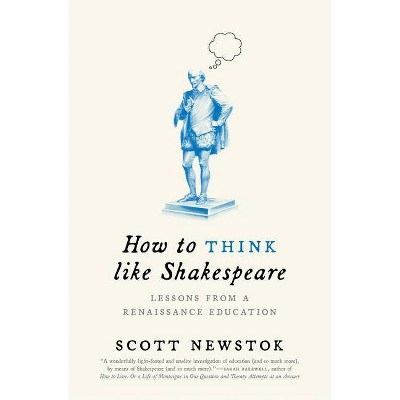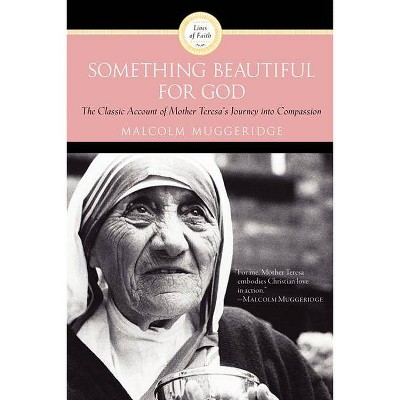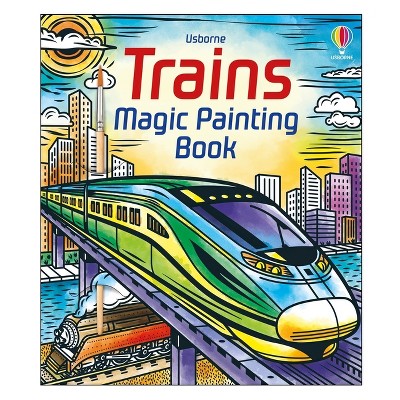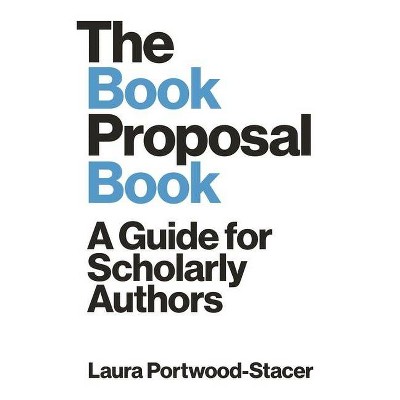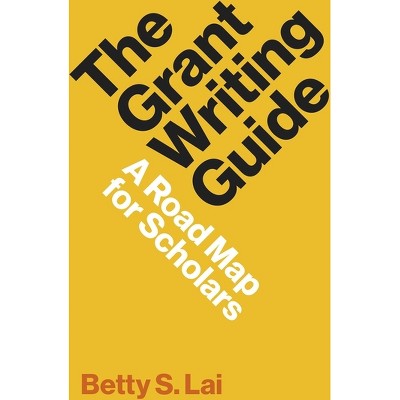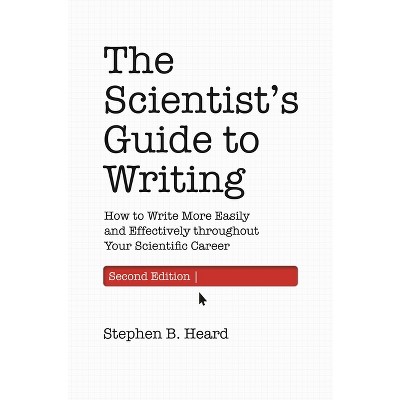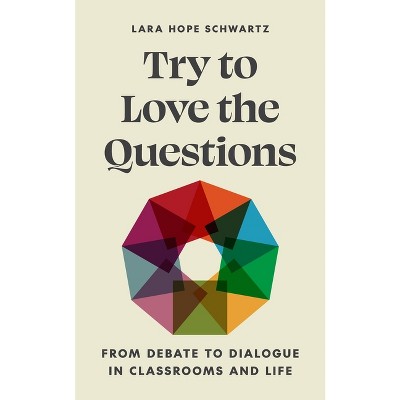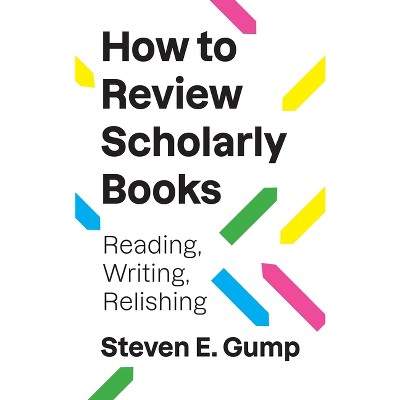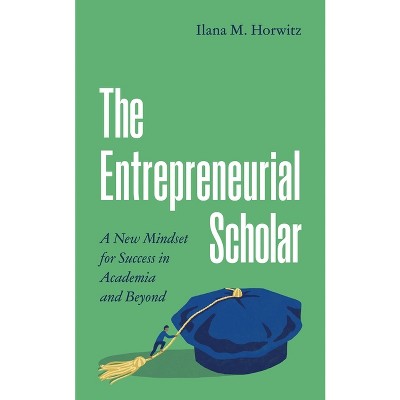Sponsored

How to Think Like Shakespeare - (Skills for Scholars) by Scott Newstok
$12.29Save $2.66 (18% off)
In Stock
Eligible for registries and wish lists
Sponsored
About this item
Highlights
- A lively and engaging guide to vital habits of mind that can help you think more deeply, write more effectively, and learn more joyfully How to Think like Shakespeare is a brilliantly fun exploration of the craft of thought--one that demonstrates what we've lost in education today, and how we might begin to recover it.
- About the Author: Scott Newstok is professor of English and executive director of the Spence Wilson Center for Interdisciplinary Humanities at Rhodes College.
- 208 Pages
- Education, Aims & Objectives
- Series Name: Skills for Scholars
Description
About the Book
"This book offers a short, spirited defense of rhetoric and the liberal arts as catalysts for precision, invention, and empathy in today's world. The author, a professor of Shakespeare studies at a liberal arts college and a parent of school-age children, argues that high-stakes testing and a culture of assessment have altered how and what students are taught, as courses across the arts, humanities, and sciences increasingly are set aside to make room for joyless, mechanical reading and math instruction. Students have been robbed of a complete education, their imaginations stunted by this myopic focus on bare literacy and numeracy. Education is about thinking, Newstok argues, rather than the mastery of a set of rigidly defined skills, and the seemingly rigid pedagogy of the English Renaissance produced some of the most compelling and influential examples of liberated thinking. Each of the fourteen chapters explores an essential element of Shakespeare's world and work, aligns it with the ideas of other thinkers and writers in modern times, and suggests opportunities for further reading. Chapters on craft, technology, attention, freedom, and related topics combine past and present ideas about education to build a case for the value of the past, the pleasure of thinking, and the limitations of modern educational practices and prejudices"--Book Synopsis
A lively and engaging guide to vital habits of mind that can help you think more deeply, write more effectively, and learn more joyfully
How to Think like Shakespeare is a brilliantly fun exploration of the craft of thought--one that demonstrates what we've lost in education today, and how we might begin to recover it. In fourteen brief chapters that draw from Shakespeare's world and works, and from other writers past and present, Scott Newstok distills enduring practices that can make learning more creative and pleasurable. Challenging a host of today's questionable notions about education, Newstok shows how mental play emerges through work, creativity through imitation, autonomy through tradition, innovation through constraint, and freedom through discipline. It was these practices, and a conversation with the past--not a fruitless obsession with assessment--that nurtured a mind like Shakespeare's. And while few of us can hope to approach the genius of the Bard, we can all learn from the exercises that shaped him. Written in a friendly, conversational tone and brimming with insights, How to Think like Shakespeare enacts the thrill of thinking on every page, reviving timeless--and timely--ways to stretch your mind and hone your words.Review Quotes
"Winner of the Parnassus Prize, Memoria College"
"Newstok explains how Shakespeare's generation was educated, and how we can return to these methods in this surprisingly enjoyable read. He romps through the world's greatest thinkers and artists, drawing on their words and a good deal of humor to make his case. Think of Newstok as an erudite guide giving you a themed tour of his commonplace book. This was a great read."---Andrew Perlot, The Monthly Reading List
"
Newstok has a deep and wide-ranging knowledge of literature, insight into why words have power, and an understanding of how to craft them. [The book] presents valuable ideas in an engaging format, and will help you understand both our education systems and your own mind better. It will also give you the tools you need to guide the latter one better, and the insight as to where you want it to go. I thoroughly recommend you give this one a try.
"---Alexandru Micu, ZME Science"With crisp, lapidary prose, Newstok writes authoritatively about the educational norms and practices that helped shape Shakespeare's mind. . . . As Newstok essays the contours of a Renaissance education, he demonstrates with verve the effect it's had on his own thinking. Put otherwise, the book is Newstok's essay at thinking--and it's a sterling attempt. . . . It will be of interest to any reader or teacher of Shakespeare--and it should be of interest to any serious reader or teacher. Watching Newstok think with Shakespeare is inspiring, and he proves an amiable guide."---Nathan M. Antiel, Principia: A Journal of Classical Education
"How to Think like Shakespeare by Scott Newstok attempts to capture what education really is, as well as what it ought to be, while also arguing where our modern system falls short, creating a disconnection from a life that is well-ordered and well-lived. . . . In an age of so much technology and lack of time for thoughtfulness, a conversation with the past might prove helpful, or at the very least expand our vocabulary."---Axie Barclay, San Francisco Book Review
"How to Think like Shakespeare is a book that does not fit neatly into any established genre. Above all it's about how to think and how to teach people to think, but it's not a how to manual. At a time when higher education is stampeding toward everything shiny, new, and up to date, this book is deliberately backward looking. It looks unapologetically to the past for ideas, models, and habits of mind that Newstok contends are just as relevant now as they were in Shakespeare's time."---Erik Gilbert, BadAssessment.org
"How to Think like Shakespeare is not the work of an activist militating for his cause but a thinker reveling in his work. Newstok reminds us that this work is, above all, fun, and the calling on display is infectious."---Karl Schuettler, Patient Cycle
"How to Think Like Shakespeare playfully juxtaposes early modern and contemporary habits of thought by way of wide-ranging examples. . . . Thought-provoking and enjoyable. . . . it is the type of book that I would like to recommend to my university students to read for pleasure--precisely because it is brief and lively and could easily engender serious reflection about how we think."---Michael Cop, Parergon
"[How to Think like Shakespeare is] a serious history of thinking, and although serious, it's very readable, and even playful. . . . How To Think like Shakespeare is a refreshing book and a stimulating read. The lively writing is a great treat, with things to smile at as you read."---Ralph Goldswain, No Sweat Shakespeare
"A bracing, witty argument for a pedagogy that is at once old and new. . . . What he demonstrates in his playful, infectiously enthusiastic pages is a more modest and more proximate idea of freedom: the kind that appears in the sheer joy of reading and learning. That joy, and the freedom it brings, come when we care about what we study. And no one has ever cared--not really--about a test."---Samuel Fallon, Renaissance Quarterly
"A clever new book."---Ian Warden, Canberra Times
"A delightful book. . . . Intelligent, perceptive, readable, useful."---Matthew Stewart, University Bookman
"A lively and evocative new volume . . . a beautifully written, succinct description of educational principles derived from the best features of a renaissance education. The book is 'deliberately short, ' but packed with quotations from the Bard and scores of great authors, all combined to make us think - and, with a little luck, to think more like 'our myriad-minded Shakespeare.' I highly recommend Newstok's book for its pith, clarity, and insight - and the sheer breadth of its bibliography, including delightful footnotes, a bibliographic essay, and an index of Shakespearean cornucopia."---Rob Jackson, Institute for Classical Education
"A playful, quote filled romp into the mind of Shakespeare."-- "Fourteen Lines blog"
"A wonderful new book."---Martha Barnette, public radio's A Way with Words
"An absolutely delightful new book . . . a luscious and stimulating read."---Michael Cathcart, Stage Show, ABC Radio National
"An engaging, witty, wide-ranging critique of contemporary pedagogical fads and a spirited provocation to return to classical and Renaissance models. . . . A book of heavy import, lightly tossed, it is at once instructive and amusing, elucidating why and how Shakespeare is good to think with."---Louis J. Kern, Key Reporter
"As a concise history of Western pedagogical development, How to Think like Shakespeare succeeds beautifully. . . . By the end of How To Think like Shakespeare, [Newstok] has us thoroughly convinced. To think and create effectively requires one to train and practice. By apprenticing ourselves to the past, we can ourselves become links in the glorious chain of human intellectual achievement."---Fernanda Moore, Chapter 16
"Clever. . . . An incisive commentary on the pitfalls of contemporary American education. . . . A smart and valuable new book."---Daniel Blank, Los Angeles Review of Books
"Clever"---John Warner, Chicago Tribune
"Eminently sensible. . . . An emphatic appreciation of just how valuable the pedagogical insights of four centuries ago remain today."---David McInnis, Australian Book Review
"Even in giving concrete, practical advice, Newstok displays a flexible virtuosity; he is a practiced craftsman at home in the workshop of language."---Joshua P. Hochschild, First Things
"Finalist for the PROSE Award in Literature, Association of American Publishers"
"Great energy and clarity . . . [How to Think like Shakespeare] is entertaining throughout: the writer convinces us that he is learning with us, that we are learning with him... One of the great features of this eloquent, uplifting, enthusiastic yet realistic and beautifully produced book is its strong sense of moment."---Tony Voss, Shakespeare in Southern Africa
"Heavily but delightfully peppered with great quotes from great minds throughout history, How to Think like Shakespeare makes for a thoroughly enjoyable read. . . . through metaphor and wit, it makes just as compelling an argument as you'd expect from a mathematical proof. . . . All in all, this is a book I couldn't do justice in any way in a simple review. Newstok has a deep and wide-ranging knowledge of literature, insight into why words have power, and an understanding of how to craft them. It presents valuable ideas in an engaging format, and will help you understand both our education systems and your own mind better."---Alexandru Micu, ZME Science
"In fourteen concise essays, Scott Newstok endeavors to diagnose and treat, if not to cure, the most persistent and pernicious ills of American education. . . . Newstok is always gracious and never polemical . . . [How to Think like Shakespeare's] most remarkable trait is its form, which is a multi-layered figure for the kind of education that Newstok hopes to revive. . . . Teachers will be refreshed to learn about the commonsense principles and practices of their lost intellectual heritage."---Christopher D. Schmidt, Moreana
"In 14 short, pithy chapters, Newstok shows how to recover the lost art of thinking."---Casey Chalk, American Conservative
"Newstok argues persuasively for a return to some of the pedagogical methods that proved so effective in the 1500s."---Paul Muldoon, Times Literary Supplement
"Newstok convinces the reader that Shakespeare was indeed a great critical thinker, and was more creative, not less so, than we initially thought. What's more, his many real-life examples show that the creativity and meaningful scrutiny attributed to Shakespeare are not only beneficial, but possible for all of us. How to Think like Shakespeare is a unique analysis of both Shakespeare's formative education and his art, and will be useful for both educators seeking to break from current, quantitative, test-based pedagogical strategies and for creatives aspiring to hone their craft. It is also an insightful manual on how we can all improve our ability to think deeper and think better."---Melissa Johnson, Teachers College Record
"One of the Times Literary Supplement's Books of the Year 2020"
"Part humanist manifesto, part commonplace book, [How to Think like Shakespeare] combines erudition and accessibility in an inviting package that is a joy to read."-- "Sententiae Antiquae Reviews"
"Scott Newstok's How to Think like Shakespeare: Lessons from a Renaissance Education really is a feel good book. A thick lather of the author's enthusiasm, a comprehensive coverage of his subject matter, and the common sense inherent in his value judgments, work together to whip up a likeminded enthusiasm in his readers . . . I found the experience of reading Newstok nothing short of exhilarating"---Ian Lipke, Queensland Reviewers Collective
"Scott Newstok's latest book, How to Think like Shakespeare, could be just the game changer the teacher (and administrator should have) ordered. . . . I couldn't help but be won over by his earnest enthusiasm for the subject and ended up wanting to hear still more."---Robert M. LoAlbo, PlayShakespeare.com
"Shortlisted for the Parnassus Prize, Memoria College"
"The chief advantage of this book is the author's replication of the Renaissance style he advocates. He makes his case with a hurricane of citations, references, and analogies that would have made Erasmus proud. . .This may be the strongest argument for rhetorical education: the Renaissance model may prepare students for the rough and tumble of social media far more effectively than the privatized, isolated pedagogy of the media based classroom."---John D. Schaeffer, Style
"This delightful book is an odd treasure. . . . [How to Think like Shakespeare is] an educational manifesto that should make for better people, better schools, colleges and universities, and better social relations between and among free citizens. There is a potential revolution in this odd treasure of a little book. Give it to some of your colleagues, if you think it isn't too late for them, but give it to all of your students. Let them know what they may have been missing - before it is too late."---Scott Crider, Ben Jonson Journal
"What a joy it was to read a book about Renaissance literature and education that not only describes these things with full respect for their historical peculiarities, but also entertains the idea that they belong (or could belong) to us in the present, as equipment for living. . . . I thoroughly enjoyed this book and recommend that anyone who cares about teaching and learning read it again and again."---Sean Keilen, Cahiers Élisabéthains: A Journal of English Renaissance Studies
About the Author
Scott Newstok is professor of English and executive director of the Spence Wilson Center for Interdisciplinary Humanities at Rhodes College. A parent and an award-winning teacher, he is the author of Quoting Death in Early Modern England and the editor of several other books. He lives in Memphis, Tennessee.Dimensions (Overall): 7.9 Inches (H) x 5.2 Inches (W) x .7 Inches (D)
Weight: .45 Pounds
Suggested Age: 22 Years and Up
Number of Pages: 208
Genre: Education
Sub-Genre: Aims & Objectives
Series Title: Skills for Scholars
Publisher: Princeton University Press
Format: Paperback
Author: Scott Newstok
Language: English
Street Date: August 31, 2021
TCIN: 83967388
UPC: 9780691227696
Item Number (DPCI): 247-03-3259
Origin: Made in the USA or Imported
If the item details aren’t accurate or complete, we want to know about it.
Shipping details
Estimated ship dimensions: 0.7 inches length x 5.2 inches width x 7.9 inches height
Estimated ship weight: 0.45 pounds
We regret that this item cannot be shipped to PO Boxes.
This item cannot be shipped to the following locations: American Samoa (see also separate entry under AS), Guam (see also separate entry under GU), Northern Mariana Islands, Puerto Rico (see also separate entry under PR), United States Minor Outlying Islands, Virgin Islands, U.S., APO/FPO
Return details
This item can be returned to any Target store or Target.com.
This item must be returned within 90 days of the date it was purchased in store, shipped, delivered by a Shipt shopper, or made ready for pickup.
See the return policy for complete information.

